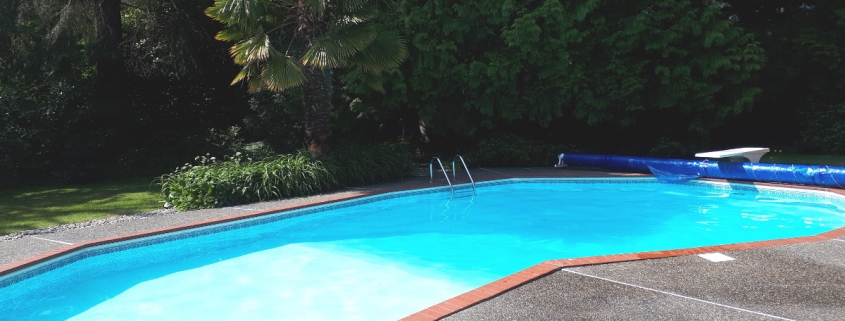The Chemicals in Your Pool and What They Do
Keeping your pool clean is as important as keeping it filled with water. But what are all these chemicals you’re exposing yourself and your family to? It’s really nothing to be worried about. Here’s a rundown of the basics for your pool supplies:
Oxidiser – chlorine (or substitutes) – disinfecting and killing bacteria
The term “Oxidizers” refers to the class of pool chemicals which release chlorine, like Calcium Hypochlorite (i.e. ordinary dry chlorine). This is the most common method of pool disinfection, although there are some others (e.g. UV light and Ozone). Water borne bacteria can make people very sick, particularly young kids. These bacteria build up over time unless the water is treated continuously, and unfortunately the most likely way of finding out if there’s a problem is when someone gets sick.
It’s definitely better to play safe. Another name for this process is “sanitizing”. The chemicals act as disinfectants. All pools, freshwater and salt, require this treatment. Sanitizers may be added manually (i.e. granules and tablets) or automatically by a salt chlorinator. It’s advisable to check with pool suppliers regarding the quantities of oxidizers your pool needs.
Acids and alkalis – adjusting the PH in your pool.
Pool water may become acid or alkaline as a result of pool treatment or other factors like water quality. Significant acidity or alkalinity can be a real problem. It’s advisable to ensure that the water is kept within the ideal pool pH range of 7.2 and 7.6. A pool with a pH above this range is too alkaline. Conversely, pH below this range means the pool is to acidic.
Of course knowing your pool’s pH requires you to test the water. This is most commonly done by pool owners using a simple test kit. It is important that you have a test kit on hand to test the pool water every week or two.
pH Decreasers
It is very common for pools to get too alkaline (i.e. a pH that is too high). This needs to be corrected because in these conditions chlorine starts to lose its effectiveness as a sanitiser. The most common chemical used to lower the pH is Hydrochloric Acid (i.e. ordinary liquid pool acid). Because virtually all pools require this from time to time, it is important to have a container of pool acid on hand ready for use.
pH Increasers
pH increasers are a special type of chemical used to counter any build up of acidity in the water. Water is naturally slightly acidic (a pH below 7.2) and adding sanitizers may create excessive acidity. These chemicals are added to achieve the correct pH level.
Maintaining the pH balance in the water also helps protect pool equipment, and reduces wear. Acidity is the main culprit in damage to pool systems, although some algae are also responsible.
Algaecides
– Algae are microscopic plants, and many are quite toxic, releasing chemicals which are poisonous and can cause quite unpleasant health effects. If you see signs of brown or green stains on your pool, it’s probably algae, and it means that the pool treatment will need to be adjusted.
The chlorine that is used to kill bacteria will also help keep algae problems at bay. Algae is however a very hardy plant that can in many cases resist ordinary chlorine levels. If you can see live algae growing on the pool walls, forget about brushing this off (this can actually spread the problem). You are going to need to add some Algaecide. These treatments typically work by allowing chlorine to penetrate the algae cells (i.e. lowering their resistance to chlorine).
Clarifiers
Pools can occasionally get “cloudy” as a result of fine particles in the water (that are too fine for the pool filter to trap). Water clarifiers work by “clumping together” this fine material into larger particles. At this point, the larger particles will either be trapped by the filter or sink to the bottom (where they can be vacuumed away).
It’s really pretty easy to keep your pool clean, sparkling and fresh. Pool chemicals are safe, reliable and will solve problems before they happen. A good pool filter and regular pool cleaning will do the rest.


Leave a Reply
Want to join the discussion?Feel free to contribute!